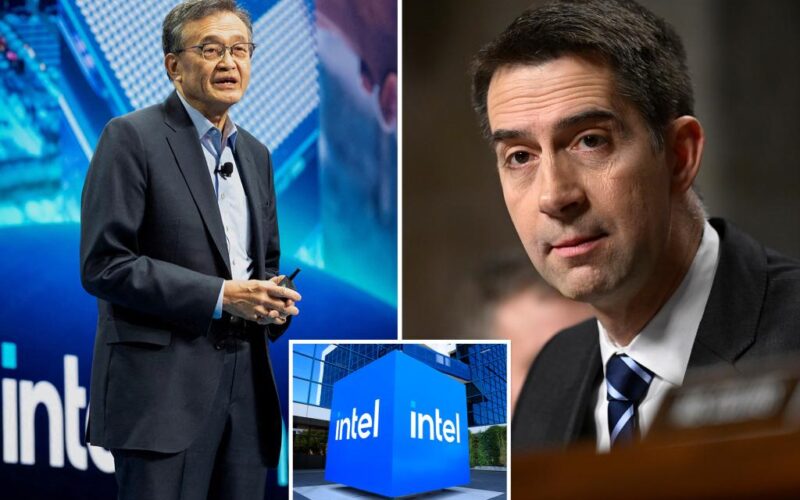A top Republican senator demanded new Intel CEO Lip-Bu Tan reveal if he has any ties to China’s Communist Party and military – citing national security concerns.
In a letter sent Wednesday to Intel Chairman Frank Leary, Sen. Tom Cotton (R-Ark.) wrote that he is concerned “about the security and integrity of Intel’s operations and its potential impact on US national security,” according to a copy of the letter obtained by The Post.
Tan replaced ousted Intel chief Pat Gelsinger in March — a year after the struggling company was awarded a whopping $8 billion in Biden-era CHIPs Act funding.
Cotton’s missive came after a report earlier this year claimed Tan invested at least $200 million across hundreds of Chinese firms between March 2012 and December 2024.
Some of these advanced manufacturing and semiconductor firms have been linked to the Chinese Communist Party and military, Reuters reported in April.
In his letter, Cotton questioned whether the board had required Tan to divest from these stakes before assuming the CEO role.
The senator asked whether Tan had disclosed his remaining investments to the US government, since Intel has a responsibility as a major recipient of federal funding.
He also demanded to know whether the board was aware of subpoenas targeting Cadence Design – which Tan ran from 2008 to 2021 – before it hired him.
“Intel and Mr. Tan are deeply committed to the national security of the United States and the integrity of our role in the US defense ecosystem,” an Intel spokesperson told The Post.
Intel added that it will address the matter with Cotton, who asked for responses by Aug. 15.
“Intel is required to be a responsible steward of American taxpayer dollars and to comply with applicable security regulations,” Cotton wrote in the letter.
“Mr. Tan’s associations raise questions about Intel’s ability to fulfill these obligations.”
In 2024, Intel was awarded $8.5 billion in CHIPs funding under the Secure Enclave program, a national security initiative to make secure microchips for defense and intelligence applications.
Later that year, the government slashed that figure by more than $600 million to about $7.85 billion. Intel still ranks as one of the top companies receiving the most federal funding.
A source familiar with the matter told Reuters in April that Tan had divested from his positions in Chinese firms.
The outlet reported at the time that Chinese databases still listed many of his investments as current.
While it is not illegal for US citizens to hold stakes in Chinese companies, there is a US Treasury list of banned Chinese firms.
Reuters reported earlier this year that Tan was not invested directly in any company on that list.
Meanwhile, Cadence Design last week agreed to plead guilty and pay more than $140 million to settle charges that it sold its chips to a Chinese military university, according to a Reuters report.
The institution was believed to be involved in simulating nuclear blasts, according to the report.
Those sales took place under Tan’s leadership at Cadence. After stepping down as CEO in 2021, Tan stayed on at Cadence as executive chairman through May 2023.








